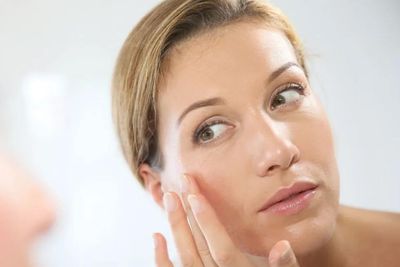From the silky smoothness of a baby's skin to the deep wrinkles of an 80-year-old, perhaps nothing reflects the movement of time so well as our skin. Here is a look at a woman's skin through the ages.
Infancy and childhood. These are the golden years of a female's skin and should be treated as such. By and large, children's skin is the healthiest health care professionals see. But this is also the time when the greatest damage-albeit unseen-may occur. That's why it's so important to protect children from the sun with the appropriate clothing, hats and sunscreen, as well as keep them out of the sun during its most intense hours, usually 10 a.m. to 4 p.m. in most parts of the country.
Teenage years. This is acne time, triggered by an increase in androgen production that results in increased oil production. A more serious problem in teenage girls, however, is their quest for a tan. Just four in 10 adolescent girls wear sunscreen, while only a third say they limit their sun exposure. Teenage girls also flock to tanning booths, with nearly one in four 15-year olds and older saying they use tanning beds. The devices are just as dangerous as the sun, if not more. Just 15 to 30 minutes in a tanning salon is the equivalent of an entire day at the beach. Additionally, tanning beds, booths and sunlamps radiate both UVB rays and long wave UVA rays that penetrate the skin more deeply than sunlight, making it even more vulnerable to the effects of the sun and increasing the risk of skin cancer.
Twenties and 30s. You've still got glowing skin, but the aging process is beginning to show. Little by little, your skin begins losing collagen, elastin-the tissues that keep the skin supple-and hyaluronic acid. Now is the time to begin a skin care regimen if you haven't already. Wash your face regularly with a mild cleanser and apply moisturizer with sunscreen religiously.
Pregnancy. About 90 percent of pregnant women develop hyperpigmentation, an overproduction of melanin that produces dark spots. About 70 percent develop melasma or chloasma, dark spots on their face and arms known as the "mask of pregnancy." Both disappear in the months following birth. Additionally, about 90 percent develop stretch marks during late pregnancy as the underlying layers of their skin stretch. Using lotions or creams containing alpha hydroxy acids can help prevent these marks, which never disappear. Pregnancy can also affect existing skin conditions. Your acne and eczema may get worse while pregnant, while psoriasis may improve.
Perimenopause and menopause. As you move into the years just before and after menopause, expect to see not only the age-related changes in your skin already discussed, but more facial hair, as well, due to hormonal changes and increases in androgen hormones. African- American women and women of Mediterranean and Arab descent are more likely to have this problem, says Maryland dermatologist Elizabeth A. Liotta, MD. Women may also notice larger pores, the result of collagen breakdown. Although the use of hormone therapy has its pros and cons, women who take supplemental estrogen generally find their skin feels smoother and less dry, says Cleveland dermatologist Amy H. Kassouf, MD, of University Dermatologists, Inc.
Elderly skin. Many elderly people develop skin lesions or growths. Most are harmless age spots, but some may be precursors to skin cancer. Older people are also more susceptible to certain skin diseases, such as shingles (herpes zoster), varicose veins, leg ulcers and seborrheic dermatitis, a skin rash. Another common skin problem includes itching. Medications—prednisone and other steroids, as well as blood thinners—and sun damage can cause the thin, fragile skin many older women struggle to protect. Their skin is easily cut or bruised, often without the woman remembering how or when she was injured. Sun protection and emollients, especially those that contain lactic acid, and even physical protection, can help safeguard older women's skin, suggests Dr. Kassouf. "I have some patients who wear shin guards because the risk of minor trauma is so great."


